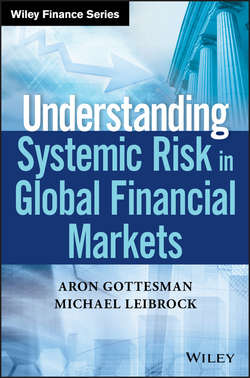Читать книгу Understanding Systemic Risk in Global Financial Markets - Gottesman Aron - Страница 12
На сайте Литреса книга снята с продажи.
CHAPTER 1
Introduction to Systemic Risk
KEY POINTS
Оглавление● No single, universally accepted definition of systemic risk exists globally.
● Although the Credit Crisis of 2007–2009 was one of the worst financial events in history, systemic risk events have been occurring for centuries, with currency crises representing one of the oldest categories of systemic risk.
● Some of the more common causes of past financial crises include currency crashes, currency debasements, bursting of asset bubbles, banking crises, and sovereign defaults.
● Even though systemic risk events have been taking place for centuries, the financial industry and regulatory bodies have only recently started to approach systemic risk identification, monitoring, and mitigation in a formal way.
● Since systemic risk events typically involve a significant dislocation in securities markets and adversely affect the real economy (e.g., recession, unemployment, taxpayer-funded bailouts, personal bankruptcies, etc.), it is critical that systemic risk drivers be understood to increase the likelihood that early warning indicators anticipate future events to minimize these negative impacts.
KNOWLEDGE CHECK
Q1.1: What development differentiates a systemic risk event from other types of financial crisis?
Q1.2: Are systemic events only a phenomenon of modern history?
Q1.3: What are the six most common causes of systemic events throughout history?
Q1.4: Significant failures within which segment of the global financial sector have fueled several of the worst systemic events in history?
Q1.5: Why is it important that the level of understanding, monitoring, and managing of systemic risks improves globally?
